Current News
/ArcaMax
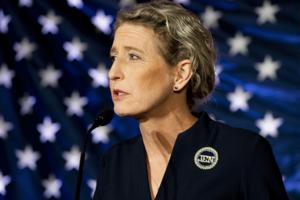
Kiggans leads bipartisan effort to temporarily extend ACA tax credits
U.S. Rep. Jen Kiggans announced Thursday a bipartisan health care proposal meant to prevent health insurance premiums from skyrocketing by extending the Affordable Care Act tax credits set to expire at the end of the year.
Thirty-five House members have signed onto the bipartisan effort, which comes as Democratic and Republican leaders are ...Read more
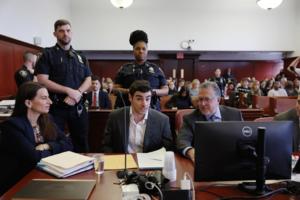
'All kinds of goodies,' said Altoona cop on finding gun Luigi Mangione allegedly used in CEO killing
Luigi Mangione sat in a lower Manhattan courtroom Thursday watching the moments just before he became a household name — one year to the day since UnitedHealthcare CEO Brian Thompson was shot dead on a Midtown sidewalk and the killer’s disappearing act left the nation rapt.
Police evidence displayed at a Manhattan Supreme Court ...Read more

Former EPA lawyer based in Seattle fights Trump-related firing
A former U.S. Environmental Protection Agency attorney who was based in Seattle is among those challenging their firings for signing a letter critical of the Trump administration.
Ted Yackulic worked for the EPA for nearly 36 years and focused on ensuring polluters paid for environmental cleanup. He would help write orders and negotiate ...Read more
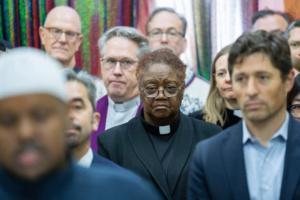
Twin Cities religious leaders unite to support Somali community and condemn Trump attacks
MINNEAPOLIS — A broad swath of religious leaders packed into a south Minneapolis mosque on Thursday to show solidarity and condemn ongoing attacks from President Donald Trump against Minnesota’s Somali community.
The crowd of more than 50 inside of Umatul Islam Center consisted of imams, pastors, rabbis and leaders from other religions who ...Read more
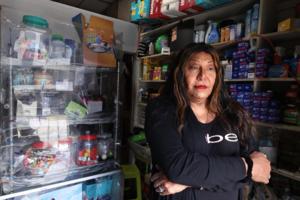
Hate crimes in LA County 'continue at record levels,' new report finds
LOS ANGELES — Hate crimes in Los Angeles County remained near record-high levels in 2024, despite slight decreases in several types of violent incidents, according to a report released Thursday.
The findings from the Los Angeles County Commission on Human Relations, presented at a news conference in Koreatown, said there were 1,355 reported ...Read more
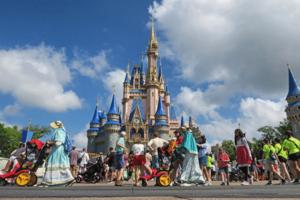
Disney World guest tries to rescue collapsed man in latest medical emergency
A Good Samaritan tried to save a man suffering the latest medical emergency to strike Walt Disney World — after a string of deaths at the Orlando park throughout October.
According to dramatic video obtained by TMZ on Thursday, an unidentified man collapsed during the Magic Kingdom’s new “Disney Starlight: Dream the Night Away” parade ...Read more
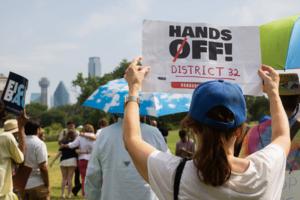
Supreme Court lets Texas use GOP-redrawn congressional map
WASHINGTON — A sharply divided Supreme Court said Thursday that it would allow Texas to use a new congressional map that targets five seats held by Democrats in next year’s midterms.
The brief, unsigned order paused a ruling from a lower court that had found the state’s new map was likely an unconstitutional racial gerrymander and ordered...Read more
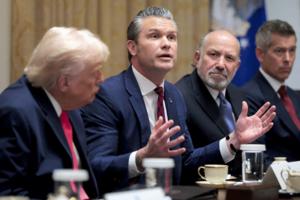
Hegseth keeps Trump's favor for now despite fresh missteps
In the high-frequency churn of President Donald Trump’s first term, Defense Secretary Pete Hegseth’s repeated missteps would have fueled guessing games about his imminent firing. In the second, he has maintained White House support — at least for now.
On Thursday, a Pentagon inspector general found that Hegseth risked endangering U.S. ...Read more
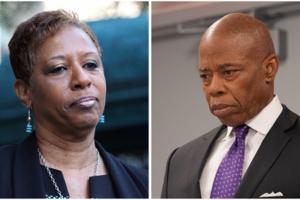
NYC City Council overrides Mayor Adams' vetoes of four bills
NEW YORK — The City Council on Thursday voted to override Mayor Eric Adams’ vetoes of four pieces of legislation, and members slammed the mayor’s attempts to shut the legislation down as attacks on working-class New Yorkers.
“This Council… has been steadfast in working for the people of the city of New York, particularly for the least...Read more
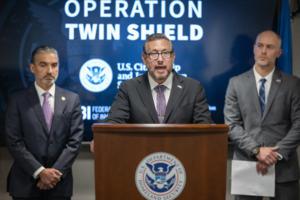
Trump restricts migrant work permits in immigration crackdown
President Donald Trump’s administration restricted employment authorization for asylum seekers and other immigrants, the latest bid to increase scrutiny of migrants entering the country.
U.S. Citizenship and Immigration Services on Thursday limited work permits for asylum seekers and others with temporary legal status to 18 months. Current ...Read more
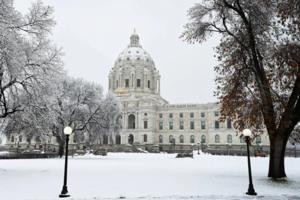
Minnesota projects $2.5 billion surplus for now, $3 billion shortfall later in decade
ST. PAUL, Minn. — Minnesota’s projected budget surplus has grown to nearly $2.5 billion in the current two-year budget cycle, though a projected shortfall of almost $3 billion is expected in the following two years.
The new budget forecast released Thursday by the Minnesota Department of Management and Budget shows a larger surplus in the ...Read more
News briefs
NYPD Commissioner Tisch’s brother calls Mamdani ‘enemy’ of Jewish people at charity dinner, sources say
NEW YORK — NYPD Commissioner Jessica Tisch’s brother called Zohran Mamdani an “enemy” of the Jewish people during a private charity dinner Wednesday night — a slam that comes on the heels of the incoming mayor’s decision to ...Read more
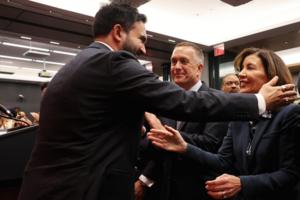
Mamdani could revoke Adams' order aimed at stopping boycott or divestment from Israel
NEW YORK — Incoming Mayor Zohran Mamdani on Thursday did not rule out revoking an executive order issued by outgoing Mayor Eric Adams that threatens city government employees with disciplinary action if they take any official actions that “discriminate” against Israel or its citizens.
“The mayor is free to issue as many executive orders...Read more
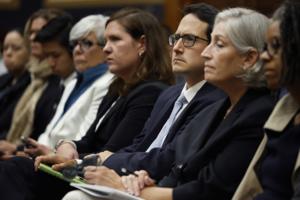
Supreme Court to hear oral arguments on Rebecca Slaughter firing
WASHINGTON — The Supreme Court is set to hear arguments Monday over President Donald Trump’s decision to fire Federal Trade Commissioner Rebecca Slaughter, in a case that could expand the control a president has over the executive branch.
Directly, the Trump administration asked justices to overturn a decision by the U.S. Court of Appeals ...Read more
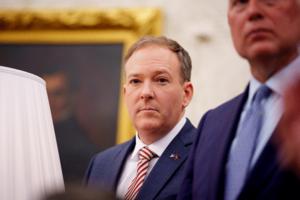
N.C. scientists fight EPA firings over petition criticizing Trump, Zeldin policies
A group of Environmental Protection Agency workers fired for signing a letter criticizing EPA Administrator Lee Zeldin have formally challenged their dismissals to a federal oversight board. Among them are two North Carolina scientists who worked at the agency’s large campus in Research Triangle Park.
“Beyond the legal reasons, I still ...Read more
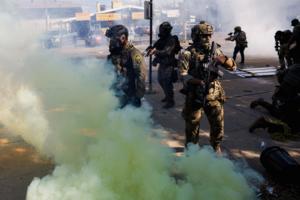
Trump lawyer claims dismissal of 'Midway Blitz' suit would block future use-of-force claims
An attorney for the Trump administration claimed in court Thursday that the dismissal of a lawsuit over the use of force by immigration agents in Chicago would bar journalists and protesters from bringing similar claims of constitutional violations in the future.
In making her argument, Department of Justice attorney Elizabeth Hedges also told ...Read more
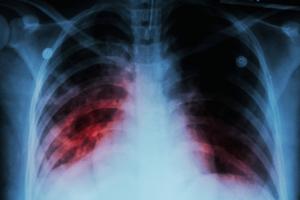
New tuberculosis case detected in Northern California. Here's what to know
After an active case of tuberculosis was detected in the Sacramento area, you may be wondering about your risks of contracting the highly contagious disease.
An individual with contagious tuberculosis was recently identified within the UC Davis “campus community,” the university said in a Tuesday, Dec. 2 news release.
In conjunction with ...Read more
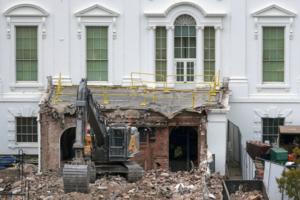
Trump replaces architect to lead $300 million ballroom design
WASHINGTON — President Donald Trump has tapped a new architect to help plan his $300 million White House ballroom wing, assigning the former lead designer to a consultant role in the high-profile and controversial project.
Shalom Baranes Associates, a Washington-based architecture firm, will design the ballroom that will be built in place of ...Read more
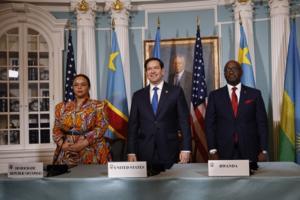
Trump lands Congo-Rwanda peace agreement with impact unclear
President Donald Trump gathered the leaders of Rwanda and the Democratic Republic of Congo to sign a peace accord and economic agreements with the U.S., though it’s unclear whether the efforts will resolve a 30-year conflict that continues to fester.
“They’ve spent a lot of time killing each other and now they’re going to spend a lot of...Read more

Central Florida immigrants seeking legal residency thrust into limbo with Trump directive
The immigration process for hundreds in Central Florida and thousands across the country has ground to a stop following the Trump administration’s sweeping directive aimed at immigrants from 19 countries dubbed high-risk.
As the region’s largest of the listed groups, Venezuelans and Haitians awaiting their asylum, green card or ...Read more
Popular Stories
- New work requirement adds red tape to Missouri's snarled food aid system
- Suspect arrested in Jan. 6 pipe bombing attempt on both parties' HQs
- As Trump calls affordability a 'con job,' Democrats unveil an affordable housing plan
- NYPD Commissioner Tisch's brother calls Mamdani 'enemy' of Jewish people at charity dinner, sources say
- ks-NC-MURDERED-CHILDREN // State to seek death penalty for N.C. man accused of murdering 4 children





